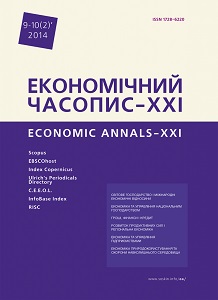ФОРМУВАННЯ ОРГАНІЗАЦІЙНО-ЕКОНОМІЧНОГО МЕХАНІЗМУ УПРАВЛІННЯ ЕКОЛОГО ОРІЄНТОВАНОЮ РЕГІОНАЛЬНОЮ ЛОГІСТИЧНОЮ СИСТЕМОЮ
FORMATION OF ORGANIZATIONAL AND ECONOMIC MECHANISM OF ENVIRONMENTALLY-ORIENTED REGIONAL LOGISTIC SYSTEM
Author(s): Yulija Chortok, Anzhelika RodymchenkoSubject(s): Economy
Published by: Institute of Society Transformation
Keywords: ecologically-oriented RLS; eco-destructive influence; organizational and economic mechanism
Summary/Abstract: Introduction. At the current stage of the national economic development, moulding and implementation the regional logistics systems (RLS) is one of the most effective ways of economic and social management both in a separate region and in the state in general. However, despite the large number of scientific publications on the selected research topic, scientists investigate only the economic and social aspects of the RLS, without analyzing their eco-destructive impact on the environment. Purpose. To analyze the prerequisites for the formation, operation and development of ecologically-oriented RLS. In order to achieve this goal, the following tasks were addressed: - prerequisites of RLS formation were analysed; - the essence of ecologically-based RLS was discovered; - organizational and economic mechanism of ecologically-based RLS was presented. Results. The authors analyzed the prerequisites for the formation, operation and development of ecologically-oriented regional logistics systems and the necessity of their creation in the regions. The authors’ definition of ecologically-based RLS has been presented. Ecologically-oriented RLS is an integrated system of logistics flow processes management, which aims at alignment of the interests, meeting the needs of RLS parties and the eco-destructive influence reduction in the region. Organizational and economic mechanism of ecologically-oriented RLS has been developed, including the subsystems of the external environment, controlling, controlled, targeted, adaptive, functional and provisional subsystems. Conclusion. Thus, the main aim of the ecologically-based RLS forming and operating is alignment and meeting the requirements of all participating stakeholders in an RLS chain «supply – production – storage – distribution – consumption – management and utilization of waste – recycling». In order to reduce an eco-destructive logistic influence in the regions, it is necessary to maximize the usage of all of the tools in areas of ecologically-oriented logistics management at the regional level as well as to create regional logistics centres.
Journal: Економічний часопис - ХХІ
- Issue Year: 145/2014
- Issue No: 09+10 (2)
- Page Range: 60-63
- Page Count: 4
- Language: Ukrainian

